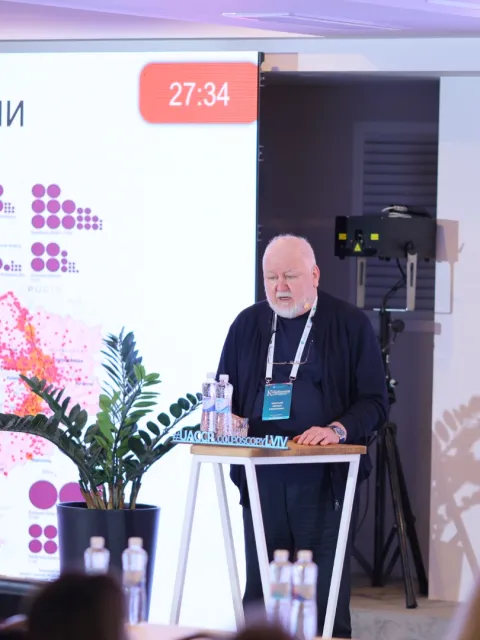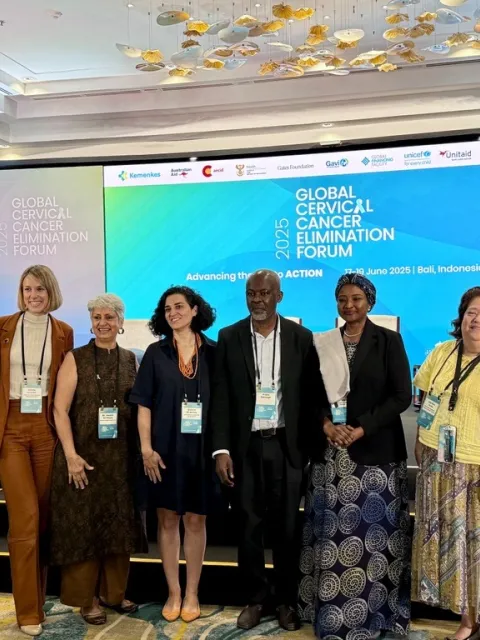Côte d’Ivoire: Raising awareness about cervical cancer
A coalition of 14 NGOs in Côte d'Ivoire is fighting the stigma surrounding cervical cancer and raising awareness about the need for vaccination and screening.

Côte d'Ivoire (Ivory Coast) is the second country after Burkina Faso of the four supported by the SUCCESS (Scale-up Cervical Cancer Elimination with Secondary prevention Strategy) project that UICC is showcasing in a series of articles on cervical cancer elimination. Secondary prevention refers to the screening and treatment of precancerous lesions, allowing for early detection of potential cancers and therefore more effective treatment.
SUCCESS, funded by Unitaid and led by Expertise France in collaboration with Jhpiego and UICC, aims to support four countries (Burkina Faso, Côte d’Ivoire, the Philippines and Guatemala) in scaling up their actions to achieve the targets set out in the WHO Global Strategy to Eliminate Cervical Cancer as a Public Health Problem, which was officially launched by WHO on 17 November 2020.
"A large percentage of cervical cancers could be prevented if at least 90% of girls aged 9-14 were vaccinated and with regular screening of women aged 25-49, which would allow earlier diagnosis and better treatment of the disease.”
– Professor Innocent Adoubi, Director of the National Cancer Control Programme (PNLCa), Côte d’Ivoire
The WHO '90-70-90' targets for 2030 outlined in the Global Strategy include vaccinating 90% of girls by age 15 against human papillomavirus (HPV), which contributes to more than 70% of all cervical cancer cases; screening 70% of women by age 35 and again by age 45 with a high-performance test; and providing adequate treatment to at least 90% of those diagnosed with cervical cancer.
Strengthening service delivery through SUCCESS
While the groundwork for SUCCESS began in 2020 to strengthen the know-how and expertise of 250 health providers in 11 districts and four regions of Côte d'Ivoire, service delivery began on 21 June 2021.
Specifically, 14 laboratory technicians were trained in HPV testing, 157 health care providers in intravitreal injections (IVT) and thermoablation (including nine gynaecologists, 20 general practitioners, 106 midwives and eight nurses), and 22 epidemiological surveillance officers and data managers (ESO/DM) in data collection, analysis and reporting.
In addition, as at 1 October, 2,469 women have been screened with the HPV test since the first on 21 June in the context of SUCCESS, with a positivity rate of 23%. 145 women received VIA (visual inspection with acetic acid) and 47 were found to have a pre-cancerous lesion. 35 women were subsequently treated with either thermocoagulation or cryotherapy. Patients with larger lesions were referred to referral centres supported by the project for loop electrosurgical excision procedure (LEEP).
To date, all sites in the regions covered by SUCCESS are equipped for thermoablation. Only two LEEP machines are available, but two more referral centres will be equipped with machines before the end of 2021.
The next steps will see the construction of a laboratory testing system to integrate HPV testing with those already in place for HIV, tuberculosis and COVID-19. As in Burkina Faso, an mHealth solution to support patient monitoring and manage data will be developed in conjunction with the Ministry of Health and integrated with the existing DHIS2 system.
Interview with Ms Fatou Fadika, President of COLCC
The SUCCESS project has fostered other developments, including the formation of a Technical Working Group (TWG) and the creation of Coalition des Organisations de Lutte contre le Cancer en Côte d'Ivoire or “Coalition of Organisation Against Cancer in Côte d’Ivoire” (COLCC).
Ms Fatou Fadika, President of COLCC, spoke to UICC about the progress of cervical cancer control in Côte d'Ivoire and the actions planned for 17 November.
What progress has civil society made in the past year?
The creation of COLCC shows the significant interest of Ivorian civil society in seeking the means and techniques to reduce the negative impact of cancer in Côte d'Ivoire.
COLCC was created on 3 September 2020 by 11 NGOs [there are now a total of 14] who have already demonstrated their ability to raise awareness of breast and cervical cancer, and the need for early detection. Since its creation, the Coalition has since registered three additional memberships, one of which is focused on childhood cancer. Other applications are awaiting approval.
It is also worth noting the synergy generated by the SUCCESS project, which is leading in the collaboration with other health platforms, such as HIV associations, and people are now more curious about cancer.
What actions is the Coalition taking to fight cervical cancer?
Cervical cancer has always been the focus of COLCC's member NGOs, who actually work more generally on women's cancers. The SUCCESS project reinforces this choice with its innovative screening system.
The Coalition is actively involved in the work of the Technical Working Group on Cervical Cancer of the National Cancer Control Programme (PNLCa), established by the Minister of Health on 5 November 2020. COLCC seeks to reduce the harmful effects of the stigma and certain beliefs that surround female cancers and particularly cervical cancer and which are at the root of late diagnosis. COLCC is working on the best strategies for outreach to the population, especially in rural areas.
What are the main ambitions and vision of the Coalition and its members to achieve the goals of cervical cancer elimination?
The vision of the COLCC is to create a strong civil society force in Côte d'Ivoire, to advocate for women's cancers, and help achieve the 90-70-90 targets for 2030 laid out in the Global Strategy for cervical cancer elimination.
We hope therefore to develop a programme to raise awareness of the HPV vaccine and expand the target age of programme beneficiaries from the current age of nine to include girls of up to 13 years of age. There is also a need to facilitate screening with innovative procedures and to establish a funding plan for screening and treatment.
COLCC also intends to ensure the sustainability of the achievements of the SUCCESS project. It encourages its member NGOs to intensify their actions in the field, both in cities and in rural areas.
What activities are planned for 17 November, marking one year since the adoption of the Global Strategy?
COLCC will launch a call to action against cervical cancer. It will send a message of awareness about and responsibility for women's cancers, emphasising that many deaths related to these cancers can be prevented by taking into account available research and implementing appropriate actions.
The event will take place on 17 and 18 November in Abidjan. It will include experience sharing, a brainstorming workshop and a formal session to recommend and disseminate the call to action.
UICC is organising a Virtual Dialogue on the role of partnerships for the elimination of cervical cancer in Francophone Africa on 17 November. This Virtual Dialogue is part of UICC’s series of Virtual Dialogues on cervical cancer elimination launched in 2020.
"A large percentage of cervical cancers could be prevented if at least 90% of girls aged 9-14 were vaccinated and with regular screening of women aged 25-49, which would allow earlier diagnosis and better treatment of the disease.”
– Professor Innocent Adoubi, Director of the National Cancer Control Programme (PNLCa), Côte d’Ivoire
Last update
Tuesday 28 February 2023
